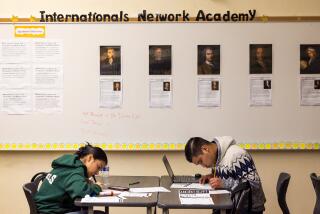Ron Fong nurtures small businesses of Asian Pacific Islanders
The gig: As the director of the Asian Pacific Islander Small Business Program in Los Angeles, Ron Fong oversees a coalition of nonprofits that offers free business counseling and services, mainly to low-income immigrants.
Founded in 1999, the organization has counseled 3,625 clients and assisted in the growth of 400 new businesses, such as Vietnamese comfort-food restaurant Good Girl Dinette in Highland Park. Since Fong took the helm two years ago, the coalition has helped open and grow businesses such as Angela Preschool & Kindergarten in the San Gabriel Valley and the Filipino barbecue hangout the Park’s Finest in Echo Park.
A helping hand: The business training programs cover the basics, including how to fill out corporate forms, put together a basic marketing plan and do accounting. All the counseling is done in the language with which the clients are most comfortable. A large portion of the people are first-generation immigrants dealing with language barriers. That’s why their assistance in language is important, Fong said.
“A lot of the folks we help need help starting a business,” Fong said. “Overlay that with the difficulty with English, and it’s really daunting. So a lot of our work really has to be one on one with these entrepreneurs.”
High-impact: While working on a graduate degree in urban planning at MIT, Fong secured an internship at the Boston Housing Authority, where he performed tedious tasks such as going to tenant meetings in Boston’s public housing projects, taking notes, writing up reports and sometimes writing applications for federal funding. He never finished graduate school. “They made the mistake of offering me a position whether or not I finished my degree,” Fong said.
He later moved to St. Louis as part of a team that created the St. Louis Development Corp., the city’s economic development arm. He took part in the planning of special projects such as the city’s $250-million football stadium and convention center expansion. “Having an effect on the city’s infrastructure was a really good experience,” he said.
First job: The son of manual laborers, he grew up in a community of entrepreneurs in El Sereno. Although his parents didn’t own a small business, many of his friends’ parents did. His first job was at age 11 working in a friend of the family’s butcher shop in Chinatown. One of his tasks was to use a large machine to steam floors and cutting boards. He made $1.40 an hour in cash. “It might have been the most fun job ever,” he said.
Building community: Many of the Asian Pacific Islander Small Business Program’s clients were licensed professionals in their home countries, but they had to switch gears when they moved to the U.S. where their credentials aren’t valid. Many clients have home businesses that they want to grow into something bigger. Some just have an idea for a business but don’t know where to start.
Fong said these clients recognize the importance of their businesses to job growth in ethnic districts such as Little Tokyo and Historic Filipinotown in Los Angeles. Moreover, they see their shops and restaurants as the face of their communities. “That’s what really attracted me to this program,” Fong said. “It was ‘How could I help each of these communities keep developing?’”
Funding challenges: Fong considers the Asian Pacific Islander Small Business Program a small business itself, and it faces challenges similar to those of its clients. The economy has put a strain on the nonprofit’s finances. The program generated $317,516 in revenue in the fiscal year that ended June 30, 2011, according to IRS documents, down about 17% from the previous year.
The SBA recently cut some funding to the nonprofit. Banks are cutting back 5% to 10%, Fong said. He cited the recent merger of two local small lenders that had each provided $5,000. “I’m now getting $5,000 from the one merged bank,” Fong said.
Every day Fong works on grant applications and calls potential corporate donors and philanthropists.
The organization recently received a $100,000 grant from Wells Fargo & Co. “It is harder now than when I started to keep this program fully funded,” he said. “I’m hoping we ride this out and we get more corporate support once the economy improves.”
Pressing on: He’s heard suggestions for growing the program by starting a business incubator or setting up a lending program. Fong said he is not sold on those ideas. “I think there are so many people who need help, especially in the communities we work in. I would be happy just doing more small-business assistance and creating jobs that way.”







